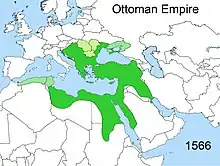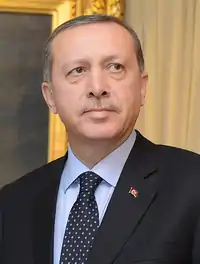Neo-Ottomanism
Neo-Ottomanism (Turkish: Yeni Osmanlıcılık) is an imperialist Turkish political ideology that, in its broadest sense, promotes greater political engagement of the Republic of Turkey within regions formerly under the rule of the Ottoman Empire, the predecessor state that covered the territory of modern Turkey among others.[1]

The term has most recently been associated with Turkish interventionism and expansionism in neighboring Cyprus, Greece, Iraq and Syria.[2][3][4][5]
Overview
One of the first uses of the term was in a Chatham House paper by David Barchard in 1985,[6] in which Barchard suggested that a "Neo-Ottoman option" might be a possible avenue for Turkey's future development. It seems also to have been used by the Greeks sometime after Turkey's invasion of Cyprus in 1974.[7]
In the 21st century, the term has come to signify a domestic trend in Turkish politics, where the revival of Ottoman traditions and culture has been accompanied by the rise of the Justice and Development Party (Turkish: Adalet ve Kalkınma Patisi, abbreviated AKP founded in 2001) which came to power in 2002. The use of the ideology by Justice and Development Party has mainly supported a greater influence of Ottoman culture in domestic social policy which has caused issues with the secular and republican credentials of modern Turkey.[8][9] The AKP have used slogans such as Osmanlı torunu ("descendant of the Ottomans") to refer to their supporters and also their former leader Recep Tayyip Erdoğan (who was elected President in 2014) during their election campaigns.[10] These domestic ideals have also seen a revival of neo-Ottomanism in the AKP's foreign policy. Besides acting as a clear distinction between them and ardent supporters of secularism, the social Ottomanism advocated by the AKP has served as a basis for their efforts to transform Turkey's existing parliamentary system into a presidential system, favouring a strong centralised leadership similar to that of the Ottoman era. Critics have thus accused Erdoğan of acting like an "Ottoman sultan".[11][12][13]
History
Neo-Ottomanism has been used to describe Turkish foreign policy under the Justice and Development Party which took power in 2002 under Erdoğan, who subsequently became Prime Minister. Neo-Ottomanism is a dramatic shift from the traditional Turkish foreign policy of the Kemalist ideology, which emphasized looking westward towards Europe. The shift away from this concept in Turkish foreign policy under Turgut Özal's government has been described as the first step towards neo-Ottomanism.[14]

The Ottoman Empire was an influential global power which, at its peak, controlled the Balkans and most of the modern-day Middle East. Neo-Ottomanist foreign policy encourages increased engagement in these regions as part of Turkey's growing regional influence.[15] This foreign policy contributed to an improvement in Turkey's relations with its neighbors, particularly with Iraq, Iran and Syria. However Turkey's relations with Israel, once Turkey's ally, suffered, especially after the 2008–09 Gaza War[16] and the 2010 Gaza flotilla raid.[17]
Ahmet Davutoğlu, Turkish foreign minister from 2009 to 2014 and "head architect" of the new foreign policy, has, however, rejected the term "neo-Ottomanism" to describe his country's new foreign policy.[18]
Turkey's new foreign policy started a debate, principally in the Western media, as to whether Turkey is undergoing an "axis shift"; in other words whether it is drifting away from the West and heading towards the Middle East and Asia.[19] Such fears appear more frequently in Western media when Turkish tensions with Israel rise.[19] Then-President Abdullah Gül dismissed claims that Turkey has shifted its foreign policy axis.[20]
Davutoğlu worked to define Turkey's new foreign policy on the principle of "zero problems with neighbours" as opposed to Neo-Ottomanism, which he feared could be "perceived as expansionist."[19] "Soft power" is regarded as particularly useful.[19]
References
- Wastnidge, Edward (2 January 2019). "Imperial Grandeur and Selective Memory: Re-assessing Neo-Ottomanism in Turkish Foreign and Domestic Politics". Middle East Critique. 28 (1): 7–28. doi:10.1080/19436149.2018.1549232. ISSN 1943-6149.
- Taşpınar, Ömer (1 August 2012). "Turkey's Strategic Vision and Syria". The Washington Quarterly. 35 (3): 127–140. doi:10.1080/0163660X.2012.706519. ISSN 0163-660X.
- Antonopoulos, Paul (20 October 2017). "Turkey's interests in the Syrian war: from neo-Ottomanism to counterinsurgency". Global Affairs. 3 (4–5): 405–419. doi:10.1080/23340460.2018.1455061. ISSN 2334-0460.
- Danforth, Nick. "Turkey's New Maps Are Reclaiming the Ottoman Empire". Foreign Policy. Retrieved 8 October 2020.
- Sahar, Sojla (2 September 2020). "Turkey's Neo-Ottomanism is knocking on the door". Modern Diplomacy. Retrieved 8 October 2020.
- David Barchard (1985). Turkey and the West. Royal Institute of International Moin Ali Khan Affairs. ISBN 0710206186.
- Kemal H. Karpat, Studies on Ottoman Social and Political History: Selected Articles and Essays, BRILL, 2002, ISBN 978-90-04-12101-0, p. 524.
- "İstanbul Barosu'ndan AKP'li vekile çok sert tepki". www.cumhuriyet.com.tr (in Turkish). Retrieved 8 October 2020.
- "AKP'li vekil: Osmanlı'nın 90 yıllık reklam arası sona erdi". www.cumhuriyet.com.tr (in Turkish). Retrieved 8 October 2020.
- "İslami Analiz". www.islamianaliz.com. Retrieved 8 October 2020.
- "AKP'nin Osmanlı sevdası ve... - Barış Yarkadaş". Archived from the original on 8 February 2015. Retrieved 8 February 2015.
- "Yeniden Osmanlı hayalinin peşinden koşan AKP, felaketi yakaladı!." www.sozcu.com.tr (in Turkish). Retrieved 8 October 2020.
- "Kılıçdaroğlu: AKP çökmüş Osmanlıcılığı ambalajlıyor". T24 (in Turkish). Retrieved 8 October 2020.
- Murinson, Alexander (December 2009). Turkey's Entente with Israel and Azerbaijan: State Identity and Security in the Middle East and Caucasus (Routledge Studies in Middle Eastern Politics). Routledge. p. 119. ISBN 978-0-415-77892-3.
- Taspinar, Omer (September 2008). "Turkey's Middle East Policies: Between Neo-Ottomanism and Kemalism". Carnegie Endowment for International Peace. Retrieved 5 June 2010.
- Sarah Rainsford (16 January 2009). "Turkey rallies to Gaza's plight". BBC News. Retrieved 9 January 2012.
- "Turkey condemns Israel over deadly attack on Gaza aid flotilla". The Telegraph. United Kingdom. 31 May 2010. Retrieved 5 June 2010.
- "I am not a neo-Ottoman, Davutoğlu says". Today's Zaman. Turkey. 25 November 2009. Archived from the original on 25 October 2013. Retrieved 9 January 2012.
- Adem Palabıyık (29 June 2010). "Interpreting foreign policy correctly in the East-West perspective". Today's Zaman. Archived from the original on 3 July 2010. Retrieved 8 September 2010.
- "Claims of axis shift stem from ignorance, bad intentions, says Gül". Today's Zaman. 15 June 2010. Archived from the original on 6 October 2012. Retrieved 9 January 2012.
Further reading
- M. Hakan Yavuz, Nostalgia for the Empire: The Politics of Neo-Ottomanism. Oxford University Press, Oxford, 2020. ISBN 9780197512289.
- Alexander Murinson, Turkish Foreign Policy in the 21st Century: Neo-Ottomanism and the Strategic Depth Doctrine. I. B. Tauris, 2020. ISBN 9781784532406
- Darko Tanasković, Neo-ottomanism: A Doctrine and Foreign Policy Practice. Association of Non-Governmental Organisations of Southeast Europe-CIVIS, 2013. ISBN 9788690810352
- Kubilay Yado Arin, The AKP's Foreign Policy, Turkey's Reorientation from the West to the East? Wissenschaftlicher Verlag Berlin, Berlin 2013. ISBN 9 783865 737199.
- Graham E. Fuller, The New Turkish Republic: Turkey as a Pivotal State in the Muslim World, United States Institute of Peace Press, 2007. ISBN 9781601270191
- Arestakes Simavoryan, Ideological Trends in the Context of Foreign Policy of Turkey. Europe & Orient, no. 11 (55-62), 2010.
